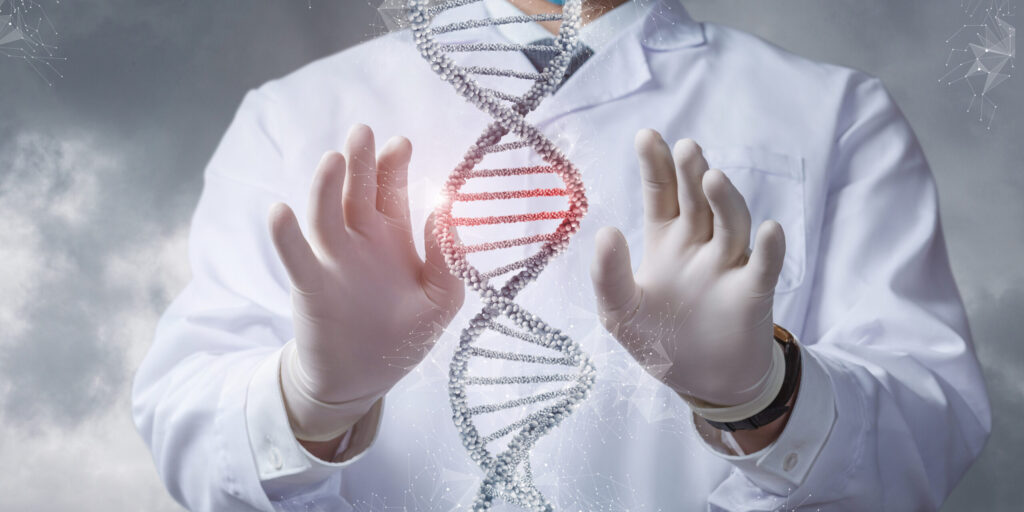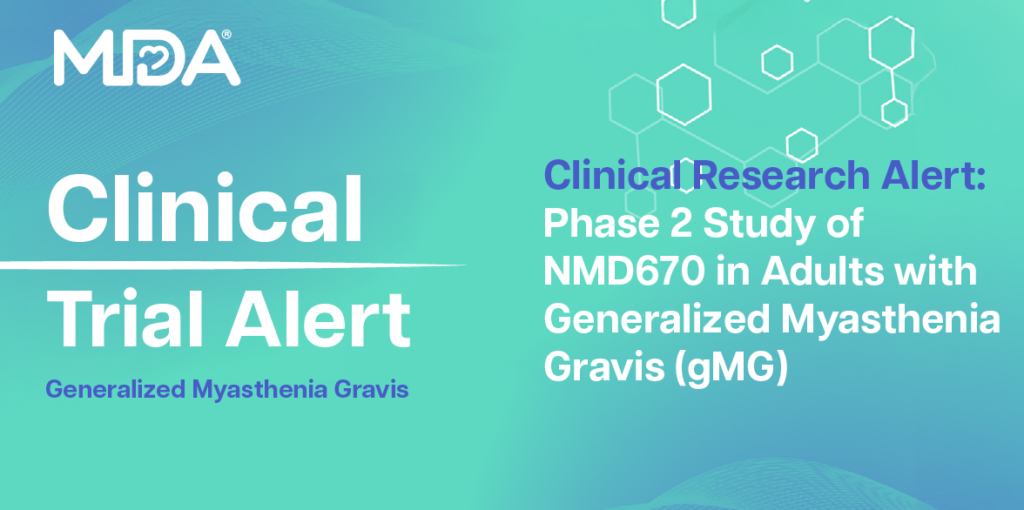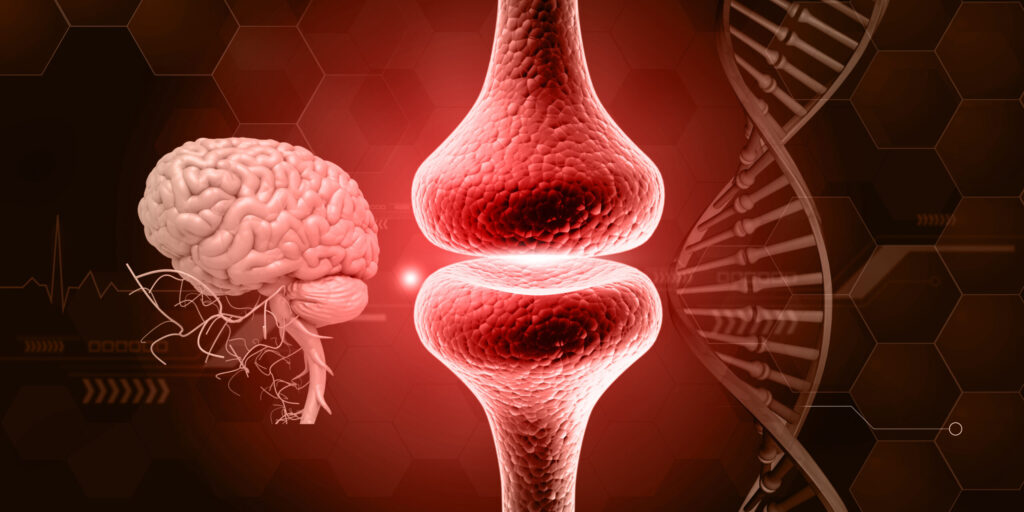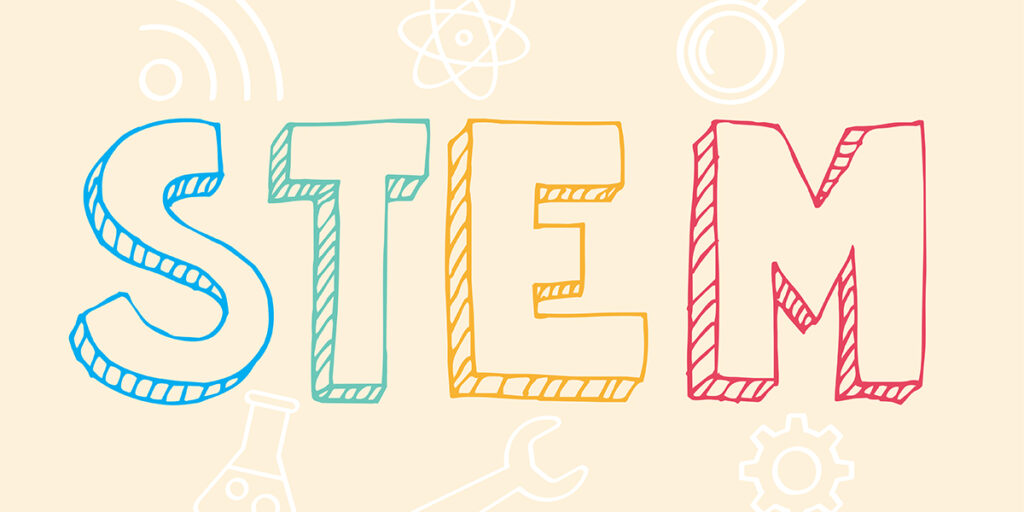
Profiles in STEM
By Darlene Demetri | Friday, May 13, 2022
Meet four individuals who prove that people with disabilities can thrive in challenging fields
Although students with disabilities indicate interest and intent to pursue science, technology, engineering, and math (STEM) careers at the same rates as students without disabilities, they do not receive an undergraduate degree or pursue STEM graduate studies at the same rates. This fact was reported by the National Institutes of Health (NIH) in 2021. They also cited several barriers, for people with disabilities, including lack of recruitment and engagement and an absence of mentors and role models.
“Research shows that people with disabilities are underrepresented in STEM and yet, at the same time there is research showing that diversity drives innovation,” says Marissa Lozano, MEd, MDA’s director of community education. “The more diversity we can bring to STEM, the more advancements we will make.”
In response, MDA launched STEM Connections in 2021, a program that exposes youth and young adults living with neuromuscular disease to STEM concepts and careers. (See “STEM for the Next Generation” below.)
Here, we profile four individuals with neuromuscular diseases who are breaking down barriers, specifically in STEM medical fields. We hope their stories of perseverance and words of advice will encourage others living with neuromuscular disease to pursue their dreams, too.
Justin Moy
Justin, 21, an MDA Ambassador, lives with congenital muscular dystrophy (CMD). He is in a combined bachelor’s/master’s program at Worcester Polytechnic Institute (WPI) in
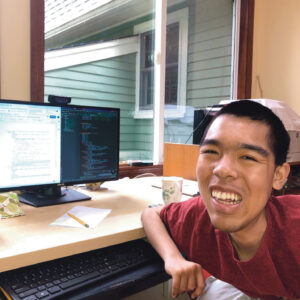
Justin Moy is studying bioinformatics and computational biology, an emerging STEM field.
Massachusetts, studying bioinformatics and computational biology, an emerging STEM field. This means he uses computer science methods, such as software that analyzes data, to find
answers to biological problems. He is applying to PhD programs and hopes to one day find a cure for CMD.
Bright start: “As a little boy, I loved playing outside in the dirt, looking for worms,” Justin says.
“My insatiable curiosity and the encouragement of my grandmother, who loved science, compelled me to pursue a STEM career.”
Making it work: Justin uses a power wheelchair and finds working with computers suits his abilities. WPI’s Office of Accessibility Services has provided accommodations such as accessible on-campus housing, adjustable desks, and relocating classes to accessible classrooms.
Words of advice: “STEM is a great career path for people with neuromuscular diseases, but think about and research the sort of STEM you want to go into,” Justin says. “Find a subject that interests you and look for people in your area that work on that subject, then reach out, explore, and network.”
Vovanti Jones, MD
Dr. Jones, 34, lives with limb-girdle muscular dystrophy (LGMD). She specializes in physical medicine and rehabilitation at the University of
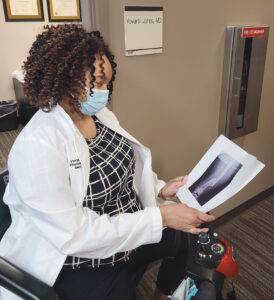
Vovanti Jones, MD, specializes in physical medicine and rehabilitation.
Missouri Health Care’s University Hospital in Columbia, where she directs the MDA Care Center and inpatient stroke rehabilitation unit. Among her duties, she’s currently working with patients who are in clinical trials testing new therapies for Charcot-Marie-Tooth disease (CMT) and amyotrophic lateral sclerosis (ALS). “I went into medicine to heal the sick and be at the forefront of changing healthcare,” she says.
Bright start: “Since age 4, I knew I was going into medicine,” Dr. Jones says. “I was interested in the way the body works and how we go about solving problems that happen to our bodies.” She loved attending science summer camps as a child.
Making it work: Dr. Jones uses a scooter in the hospital because it is small and maneuverable. In other settings, she uses a power wheelchair. The university’s Office of Accessibility and ADA provides her with an adjustable desk and automatic doors in her office, a raised toilet seat in the bathroom, and a scribe for note-taking.
Words of advice: “To go into any advanced STEM career, such as medicine, you must advocate for yourself,” Dr. Jones says. “Don’t allow school administrators to box you into their ideas about what you can and cannot do. But be realistic about your limitations. There are aspects of medicine I can’t do — I can’t be a surgeon. But I can do rehabilitation medicine, which requires a different skill set.”
Nikaela Losievski
Nikaela, 25, lives with spinal muscular atrophy (SMA). She is pursuing her doctorate in neuroscience at Ohio State University (OSU) in Columbus and is studying the molecular
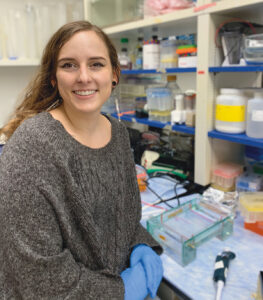
Nikaela Losievski is studying the molecular mechanisms behind SMA.
mechanisms behind SMA. “Scientists think the SMN protein is involved in several processes, but there’s no definitive evidence for most of them,” she says. She is focusing on one proposed function of SMN protein to help figure out why the disease occurs. Once she earns her PhD, Nikaela plans to continue with research, studying RNA (a molecule similar to DNA) in neurological diseases.
Bright start: “I was always making concoctions when I was young. Whenever my mother heard the water running in the sink upstairs, she started panicking because she knew I was making a potion,” Nikaela says. “I’ve always had an experimental mind.”
Three high school science teachers further ignited her passion for pursuing a career in STEM. “Because they were women, I could see myself in their shoes,” she says.
Making it work: Nikaela uses a manual wheelchair with a smart drive. In the lab, she’s found that clear, constant communication with project leaders helps her do her job. “It is vital to know what they expect of you but also that they understand your reality with a chronic illness,” she says. She alerts her supervisor the moment she notices a potential barrier, so he can help advocate on her behalf.
Words of advice: Nikaela recommends searching organizations’ websites for scientists in career paths you might be interested in, then reaching out to them for information or advice. “Once you know where to look, just ask. What’s the worst that can happen?” she says.
Marc van de Rijn, MD
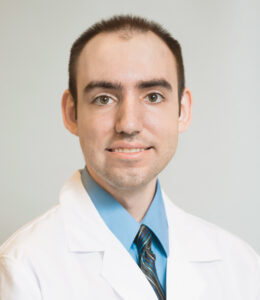
Marc van de Rijn, MD, often works with patients with neuromuscular diseases.
Dr. van de Rijn, 34, lives with facioscapulohumeral muscular dystrophy (FSHD). He specializes in physical medicine and rehabilitation, as well as neuromuscular medicine. He currently practices physiatry at Spaulding Rehabilitation Hospital in Boston. “Physiatrists treat disease yet also focus on the whole patient, their function, quality of life, and rehabilitation,” Dr. van de Rijn says. He often works with patients with neuromuscular diseases and neurological conditions such as Parkinson’s disease.
Bright start: “I enjoyed biology and chemistry in grade school, but then I got into computers in high school,” Dr. van de Rijn says. After completing a computer programming internship, he realized he wanted to practice medicine. “My FSHD diagnosis at age 12 certainly influenced my choice of specialty,” he says.
Making it work: Dr. van de Rijn walks slowly because of weakness in his legs, so the hospital gave him access to the closest parking lot. He also has difficulty writing and typing, so the hospital provided speech recognition software to help him do chart documentation.
Although he’s customized the clinic to his needs, he also sees patients on a medical floor, where he has less control over the environment. “There are in-the-moment concerns. But something you learn when you have a physical disability is that you can’t be afraid to ask for help,” Dr. van de Rijn says.
Words of advice: “Being successful is not about whether you can or cannot do something, it’s about not being afraid to ask for adaptations, equipment, and accommodations to allow you to do the job at the same level as someone without a disability,” Dr. van de Rijn says.
Darlene Demetri is a Connecticut-based freelance writer living with FSHD.
STEM for the Next Generation
MDA’s STEM Connections program provides hands-on activities for kids and young adults living with neuromuscular disease to learn STEM concepts and explore STEM-based careers in a supportive environment.
This year’s program involves two robust components.
MDA Summer Camp
Summer Camp is available for youth ages 8-17 in-person at more than 20 sites across the United States, as well as virtually. In either option, campers will participate in fun activities designed to expose them to different aspects of STEM.
Each camper will receive a STEM activity kit at no cost. Virtual campers will be mailed a kit containing materials and flashcards outlining each activity with links to videos, interactive content, and more.
Register for MDA Summer Camp or apply to volunteer.
Fall Mentoring Program
This four-week program, offered virtually to participants ages 16-21, provides opportunities to connect with and learn from people who are thriving in STEM fields, including STEM professionals living with neuromuscular disease.
Participants attend two video sessions each week, covering topics such as job exploration, self-advocacy, and obtaining accommodations at school, college, and work. They also complete small-group projects led by mentors. Materials are provided at no cost and mailed in advance.
Volunteer to be a STEM mentor by emailing ResourceCenter@mdausa.org or calling (833) 275-6321. Registration for participants will open in late summer 2022.
Disclaimer: No content on this site should ever be used as a substitute for direct medical advice from your doctor or other qualified clinician.


